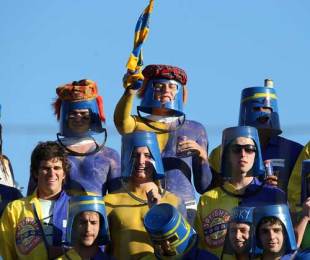|
Comment
Public humiliation for New Zealand administrators
Huw Turner
March 30, 2009

Highlanders fans cheer on their side at their temporary home in Palmerston North at the weekend
© Getty Images
Enlarge
Super Rugby has clearly become a white elephant and ultimately threatens the game in what is widely regarded as the world's leading rugby nation. If there remains any doubt about the validity of the above statement, then consider the following: What would be the reaction in the UK if the Cardiff Blues or the Leicester Tigers could no longer command a worthwhile live audience and had to re-locate a home match to Gloucester or Northampton, respectively? I have a pretty good idea - there would be widespread rioting, a return to the three-day week and within weeks a change of government! Well, clearly none of those things are going to happen, but neither is the scenario I have outlined because the club/regional rugby base within the Six nations countries is so strong and well established. But precisely such a scenario was enacted in New Zealand last weekend when the Otago Highlanders faced the South African Bulls in Palmerston North. The Highlanders are New Zealand's most southerly franchise, based in Dunedin in the deep south east of the South Island. So what were they doing in Palmerston North, a non-descript provincial outpost in the Manawatu, north of Wellington in the North Island? In the words of the Highlanders' CEO Richard Reid, "trying to secure a better audience", something they have been unable to do at Carisbrook. A sound business decision? Perhaps, but to my mind this is a public humiliation for the NZRFU as it struggles with its SANZAR partners to manufacture a credible and viable tournament for 2011, its broadcasting contract with News Corp, which bankrolls and effectively owns Southern Hemisphere rugby, running out at the conclusion of the 2010 Tri Nations. Finally, with that deadline clearly in its sights, the NZRFU has started to accept what most rugby followers in New Zealand have been saying for at least the last five years - they are not interested in Super Rugby, they are alarmed at the prospect of an expanded series from 2011 onwards and they cannot understand why the Currie Cup in South Africa is allowed to flourish whilst the once mighty National Provincial Championship (NPC) has been left to languish, shorn of the best New Zealand players and relegated to a semi-professional feeder competition to Super Rugby.
Last week NZRU CEO Steve Tew , referring to the 2011 competition, said, "We are of a very strong view that the competition needs to start later for a host of reasons, not the least of which is our fans telling us by voting with their feet, that February is too early for rugby." He might also have added that March is too early for rugby, especially when visiting South African sides are concerned. Two weeks ago, Aucklanders had a choice between an ODI cricket match between New Zealand and India, the start of the New Zealand Warriors competitive NRL season against the Parramatta Eels and the Blues and the Cheetahs at Albany Stadium on the North Shore. The latter came a distant third in terms of audience appeal, perhaps prompting this stinging editorial the following weekend from the New Zealand Herald. With the headline "Rugby must think outside the Boks", it argues, "Even some of rugby's most ardent fans have become bored with a stale diet of Super matches followed by the accompanying Tri-Nations championship. The mystique once associated with South Africa has disappeared. This will come back only if competition becomes less frequent, both at the Super and international level. Thus, there is also a case for abandoning the Tri series. This would have the added benefit of freeing up the playing calendar, thereby allowing a greater emphasis on the NPC and the revival of extended tours by the All Blacks. Their game against Munster last year offered a reminder of the great tours of yesteryear both to the British Isles and South Africa." In all fairness, this has become really tricky for New Zealand's rugby administrators. In spite of all the criticism of Super and Tri series rugby, alternatives such as an expanded Australasian/Pacific is unlikely to generate the sort of income needed to keep New Zealand's best playing at home. And, just as this is becoming apparent and various solutions offered to address the problems associated with player drain are contemplated, up pops Christian Cullen in Hong Kong with his views on player sabbaticals. They will destroy the game in New Zealand, is the gist of his argument. Well, I have been arguing that in this column for some time now. So, back to the cricket and a Test match in Napier between New Zealand and India which is shaping up very nicely indeed. © Scrum.com
| |||||||||||||||
Live Sports
Communication error please reload the page.
-
Football
-
Cricket
-
Rugby
-
- Days
- Hrs
- Mins
- Secs
F1 - Abu Dhabi GP
Abu Dhabi Grand Prix December 11-131. Max Verstappen ()
2. Valtteri Bottas (Mercedes)
3. Lewis Hamilton (Mercedes)
4. Alexander Albon ()
5. Lando Norris ()
6. Carlos Sainz Jr ()
-
ESPNOtherLive >>
Golf - Houston Open
Snooker - China Open
Tennis - Miami Open

